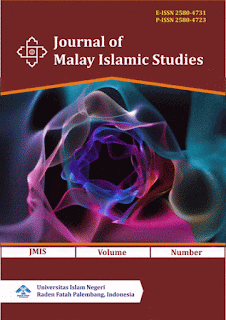FROM INCULCATING ISLAMIC VALUES TO ‘RAHMATAN-LIL-ALAMIN’: PROMULGATING VARIOUS APPROACHES OF ISLAM IN MALAYSIA
DOI:
https://doi.org/10.19109/jmis.v3i1.4572Keywords:
Islamic Values, Rahmatan-Lil-Alamin, Promulgating, Approaches of IslamAbstract
The government of Malaysia has introduced ‘Inculcating Islamic Values’ during the reign of Prime Minister Dr Mahathir in the 80s, ‘Civilizational Islam (Islam Hadhari)’ during the reign of Prime Minister Abdullah Badawi in 2004, ‘Wasatiyah’ during the reign of Prime Minister Najib Razak in 2010 and ‘Rahmatan-lil-Alamin’ recently in 2018 under the new government. All the approaches were designed towards developing a modern society in predominantly Malay-Muslim society of Malaysia. The concepts were normally publicized as a part of the manifesto during the political campaigns prior to the general elections. Since then, Malaysians, Muslims and non-Muslims alike were expecting to observe more detail explanations of the concepts and how it could be translated into actions in the multi-religion society. Occasionally the Prime Minister will reiterate the approaches and spell out in detail the methods of implementing the concept or to translate the concepts into policies. The concepts will further be elaborated in a couple more speeches delivered by the Prime Minister and senior ministers including the information minister. The mainstream media has also allotted special columns and programs to outspread the concepts even though at times not in detail and lack of continuity. Today, after about one year since the latest concept (Rahmatan-lil-alamin) has been conceived, what are the peoples’ perceptions towards it? Do the people really made to understand the concept? To what extent has the media been used to disseminate the idea? This paper will discuss the analysis of the dissemination of the concept through the main stream media in Malaysia.
References
Chong, Terence (2005). The Construction of the Malaysian Malay Middle Class: The Histories, Intricacies and Futures of the Melayu Baru. Social Identities 11(6):573-587. November 2005.
Hock, O. Y. (1991). Multi-racial politics in Malaysia. Kuala Lumpur: Pelanduk Publication (M) Sdn. Bhd.
Ibn Khaldun. (1993). Mukaddimah Ibn Khaldun. Kuala Lumpur : Dewan Bahasa dan Pustaka.
Lee Hock Guan. (2006). Globalization and Ethnic Integration in Malaysian Education. In Saw Swee-Hock & K. Kesavapany (Eds.), Malaysia: Recent Trends and Challenges (p. 232). Singapore: Utopia Press Pte. Ltd.
Mahathir Mohammad. (2000). Globalization, smart partnership, and government. In Hashim Makaruddin (Ed.). Selected speeches by Dr. Mahathir Mohammad Prime Minister of Malaysia. Kuala Lumpur: Pelanduk Publications (M) Sdn. Bhd.
Mahathir Mohammad. (2000). Islam, knowledge and other affairs. In Hashim Makaruddin (Ed.). Selected speeches by Dr. Mahathir Mohammad Prime Minister of Malaysia. Kuala Lumpur: Pelanduk Publications (M) Sdn. Bhd.
Mahathir Mohammad. (2006). Islam, knowledge, and other affairs. Kuala Lumpur: MPH Group Printing Sdn. Bhd.
Means, Gordon P. (1991). Malaysian Politics: The Second Generation. Oxford: Oxford University Press.
Mohamed Salleh Abas (1987). Sejarah Perlembagaan Malaysia. Kuala Lumpur: Dewan Bahasa dan Pustaka
Downloads
Published
Issue
Section
License

Journal of Malay Islamic Studies is licensed under a Creative Commons Attribution-ShareAlike 4.0 International License.


